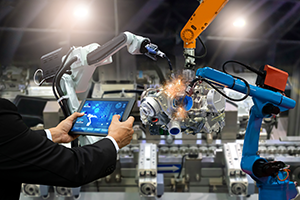“The Fourth Industrial Revolution is still in its nascent state. But with the swift pace of change and disruption to business and society, the time to join in is now.”
– Gary Coleman, Global Industry and Senior Client Advisor, Deloitte Consulting

“The Fourth Industrial Revolution is still in its nascent state. But with the swift pace of change and disruption to business and society, the time to join in is now.”
– Gary Coleman, Global Industry and Senior Client Advisor, Deloitte Consulting
No one wants to miss out on business opportunities, especially when the statistics show enormous potential. Of course, it isn’t possible to take advantage of innovations if you’re unaware of what they are, or unable to see where or how they can be utilized.
Imagine a factory where robots, sensors, and databases communicate with one another. What if they could also be automatically managed by a central intelligence that oversees and controls operations at all levels? Imagine a refrigerator with sensors that can communicate with your smartphone and machine intelligence apps that can recommend menus based on health data received from your smartwatch and then prepare and order a grocery list based on all that information.
This is the essence of Industry 4.0.
Industry 4.0 is the next step in industrial technology, with robotics, computers, and equipment becoming connected to the Internet of Things and enhanced by machine learning algorithms. Automation, intelligence, cyber-physical systems, and their collaboration, are imperative to industry 4.0, making possible the streamlined interconnectivity.
“In the new world, it is not the big fish which eats the small fish, it’s the fast fish which eats the slow fish.”
– Klaus Schwab, founder and executive chairman, World Economic Forum
Mike Grandinetti, Global Professor of Innovation, Entrepreneurship & Marketing at Hult International Business School (MBA, Yale), summarizes the need for managers to understand Industry 4.0 well, “Disrupt or be disrupted. Business as usual leads to certain failure. Leaders must take a comprehensive, adaptive, and courageous approach in order to thrive in the Industry 4.0.”
Managers and executives need to understand the mechanism and application of industry 4.0 so that they can ride the waves of change. Multiple Fortune 500 companies have lost their status simply because they couldn’t keep pace with the digital revolution.
This course serves as an introduction to the fourth industrial revolution, it’s major systems and technologies, and its potential impact on business and society. Adaptation of connected intelligence into businesses and society is increasing at an astonishing speed, which will completely change the way we conduct business.
This is a non-technical course and is ideal for key decision-makers of organizations who would like to lead the transformation of their organizations through the implementation of cutting edge technologies like IoT, Cloud Computing, Big Data Analytics, Machine Learning, Artificial Intelligence, Cyber-Physical Systems, and Cognitive Computing.